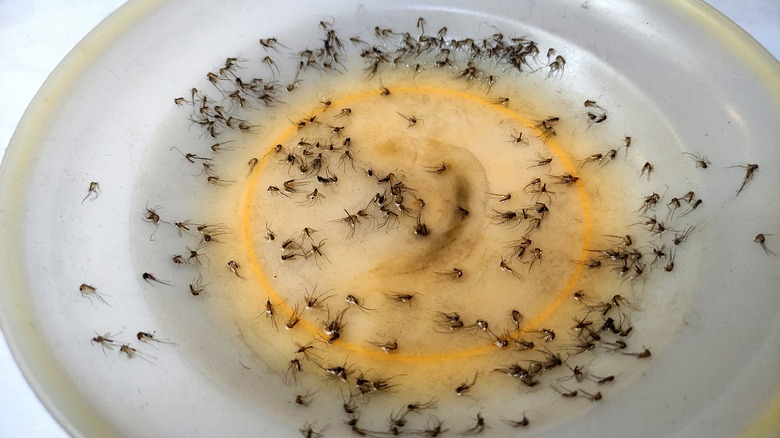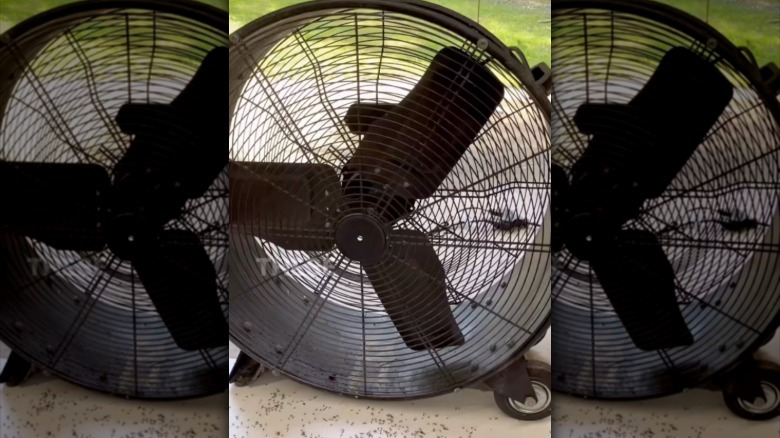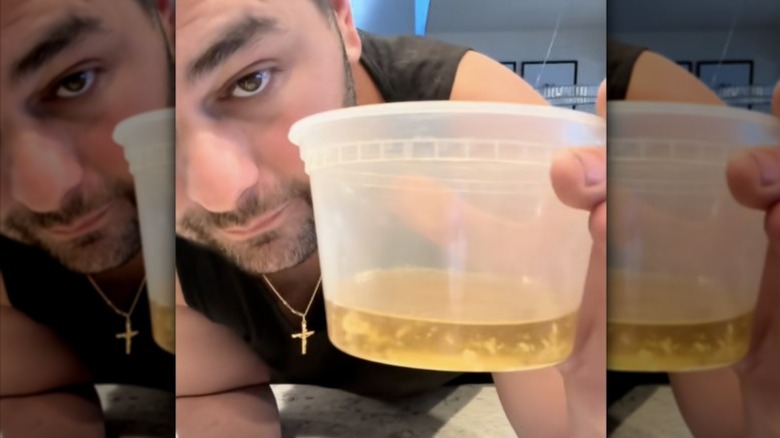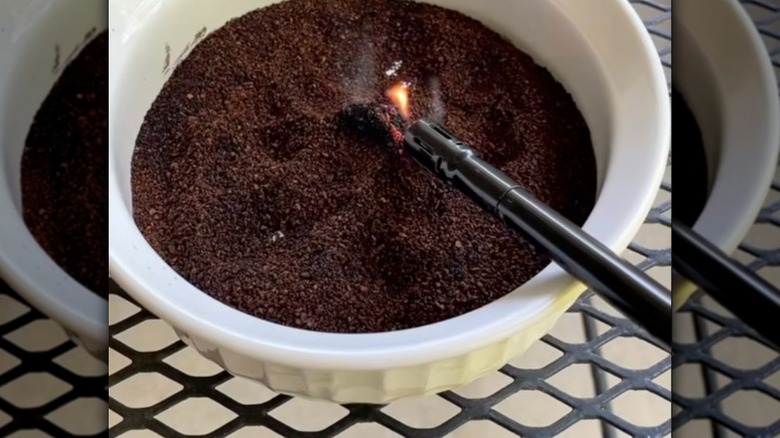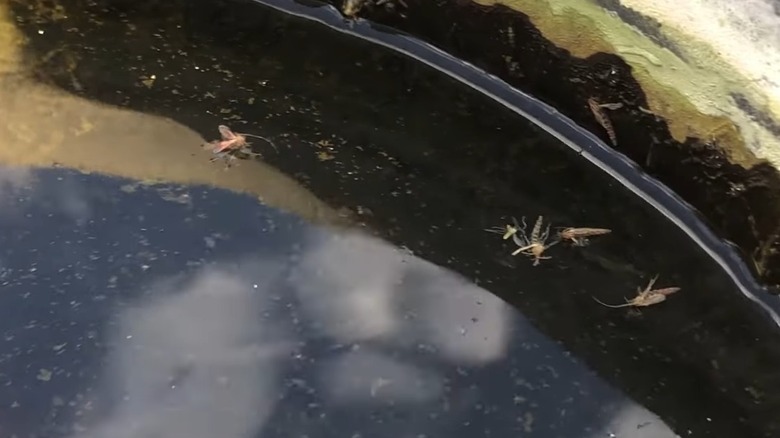Simple DIY Mosquito Traps & Repellents To Try In Your Home And Garden
Mosquitoes can be the bane of most people's lives. You're minding your own business and trying to relax when suddenly, you feel an itch. You check your arm and spot that tell-tale red bump. But it's not just the itch you've got to worry about; mosquitoes can carry dangerous diseases like Zika virus, West Nile virus, and malaria. If you're one of the unlucky people they are attracted to, then first, we offer our condolences. Secondly, you know you've got to act fast by either repelling them from your living areas or trapping them and making them pay for trespassing into your world.
That's where we come in. We've looked for the simplest yet most effective solutions for keeping your home and yard mosquito-free. Here are some of our favorites. Just a tip, though: Whichever trap or repellent you decide to use, keep in mind that creating traps could backfire and lead to increased mosquitoes in the area. That's because they will become drawn to the thing that will eventually kill them. Plan your strategy accordingly and place them on the edges of where you plan to sit. Finding the correct distance might take some trial and error, but once you get the right positioning, these traps might make your outdoor experience much more pleasant. If you don't notice a decrease in mosquitoes, move on to more tried and true methods, such as removing standing water sources from your yard and installing fans.
Create a mosquito trap with a two-liter bottle and sugar water
To create this simple trap start by slicing the first third off of a two-liter bottle, then invert the top so that the neck sits inside the bottle, like a funnel. This will be your trap. Next, you'll need to lure the mosquitoes in. Create a mosquito-attracting nectar by dissolving two tablespoons of brown sugar into one cup of hot water. Pour the liquid into the trap and place it somewhere that's away from where people usually congregate.
This bottle-turned-funnel is one of the more popular DIY bug traps we've seen on TikTok, thanks to how easy it is to create and how versatile it can be for holding any sort of liquid-based trap. Mosquitoes use the sugars in flower nectars and fruits as an energy source, so they're attracted to the scent of sugar in the trap. There are numerous debates about which type of sugar works best, but some anecdotal evidence suggests that brown sugar may be the most effective as it's considered to have fewer impurities than processed white sugars. Regardless of whichever type of sugar you opt for, the bottle funnel works by luring the mosquitoes down the funnel, trapping them at the bottom. Mosquitoes are unable to find the smaller hole they entered and will eventually drown in the sugar water.
Trap mosquitoes by adding a net backing to a fan
This simple DIY trap requires a fan, screen or mesh fabric, scissors, and tape. Measure the dimensions of the side of the fan that acts as the exhaust. Measure out a piece of mesh fabric so that it's a little bigger than the fan. The video isn't specific about this, but you'll need some extra fabric to secure the mesh into place and act as a net. Secure the mesh to the back side of the fan and make sure it's sealed all the way around, but not taut. Once it's ready, turn the fan on with the mesh side facing away from you and let it run.
How is a fan with a net so effective? As this video shows, it works because, according to research in journals like Journal of Medical Entomology, mosquitoes are weak fliers and cannot resist the wind forces a fan creates. The fan's suction pulls in the mosquitoes while the netting on the back traps them until they die. Regarding the type of fan, box or pedestal fans may work; many TikToks show them being successful in small rooms. But if you're working in a garage, warehouse, or outside, you'll probably want something heavier-duty like this TikTok shows.
Use apple cider vinegar and dish soap to trap mosquitoes
Not interested in doing a plastic bottle funnel? There's another simple trap you can make with a few liquid ingredients as this TikTok shows. All you need is an open container, apple cider vinegar, and liquid dish soap. Pour the apple cider vinegar into the container and add a squirt of dish soap. Gently mix the two together, but not so much that you make bubbles. Then put the container near where you've noticed the mosquitoes and leave it out. It may smell at first but the vinegar scent will go away over time.
While there are no scientific studies that back this up, sometimes anecdotal video evidence can speak well enough for itself. The reason people think this is so effective is the theory that apple cider vinegar attracts mosquitoes thanks to its pungent aroma. Once they land on the stagnant vinegar, the dish soap may coat mosquitoes' wings, weighing them down. Since they aren't strong fliers, they can't lift their coated wings and bodies out of the vinegar, so they eventually drown.
Create a mosquito repelling incense with coffee grounds
Love the smell of coffee? If so, this one is for you! This DIY isn't a mosquito trap but a repellent, so consider giving it a try instead of using citronella candles, which have long been debunked on their effectiveness. Start with a fire-safe bowl and place it away from flammable objects. Next, add fresh coffee grounds into the bowl, adding enough that you fill it at least halfway (but the more, the better). Then, pinch the center of the grounds and pull up to create a cone shape in the middle. Once you've got a nice little mound ready, use a BBQ-style lighter and ignite the "cone" until you see smoke.
So why does a coffee-based "incense" work so well at keeping pests like mosquitoes away? Well, as David Blue, the co-founder of Mozzie Dome Pest Control told Livingetc, "Coffee grounds are both extremely concentrated and potent ... Burning coffee grounds disrupts [a mosquito's] very ability [to smell our scent] by overloading their sensory receptors...[making] the mosquitoes disoriented, leaving them unable to find their target." Plus, a study published in Parasites & Vectors found that female mosquitoes (the ones who bite you) were so repelled by the presence of coffee that it prevented them from laying their eggs. The researchers used cups filled with coffee extract or water and introduced gravid female mosquitoes to the area to see if there would be a difference in the amount of eggs laid. Of 4,462 eggs laid (Yes, we know. That's a terrifying number of mosquito eggs!) only 3.34% (149) were laid in coffee, while 96.66% (4,313) were laid in water. The researchers suggest that these findings show that coffee has the potential to be a powerful mosquito control tool.
DIY your own mosquito repellent with oil of lemon eucalyptus
Want a one-ingredient solution that's as effective as DEET but without the bad publicity? That's where oil of lemon eucalyptus comes into play. It's a non-toxic, plant-based DEET alternative that's effective on its own for repelling mosquitoes anywhere from two to five hours. A study published in Wilderness & Environmental Medicine found that it may even be more effective than DEET against mosquitoes and ticks, making it perfect for your next camping trip. All you need to do is spray it on your skin or clothing and let it do its thing.
But before you head out for some oil shopping, keep in mind that oil of lemon eucalyptus and lemon eucalyptus oil are two different things. Unfortunately, they aren't swappable either since lemon eucalyptus oil doesn't have nearly enough para-menthane-3,8-diol (PMD), the thing that makes oil of lemon eucalyptus so effective. Look for "OLE" or "PMD" to ensure you're getting the right stuff.
Repel adult mosquitoes with peppermint oil
If you want to keep it simple and would prefer to avoid keeping an open container of vinegar out in the open, consider making a peppermint oil repellent instead. All you need is peppermint essential oil, a carrier oil (basic vegetable oil will do), and a bowl. Pour the vegetable oil into the bowl and add a few drops of peppermint essential oil. Place the bowl in any area you want to be free of mosquitoes. Just be mindful of where you place your mosquito trap as the ASPCA considers mint to be toxic to cats, dogs, and horses.
So what is it about peppermint oil that makes it so effective? The secret is in its main active ingredient: menthol. Menthol has been used for years not only as an effective adult mosquito repellent but as a fantastic killer of their larvae, too. And science backs this up, summarized by the Cornell Cooperative Extension. Cornell notes that a study published in Bioresource Technology found that adding only 3ml of the oil was effective for destroying larvae, while another paper in the Asian Pacific Journal of Tropical Biomedicine found that a body oil containing peppermint oil would repel female mosquitoes from biting humans. However, essential oils can be harmful if used alone, which is why we'd recommend using it in a bowl of oil instead.
Turn a black bucket into a mosquito trap with water and oil
For this easy trap, you'll need an opaque black bucket, linseed oil, and water. Fill your bucket with water, and then add a tablespoon of linseed oil. Place the bucket off to the side of an area where you'll be hanging out or in a corner of your home. If you're worried that animals or children might try to drink your trap, you can place the bucket in a cardboard box; just fold the box's top flaps down so that mosquitoes can still get in.
Mosquitoes are drawn to stagnant water sources, and a bucket of water sitting around is like paradise to them. The black color of the bucket is easy for mosquitoes to see, and the linseed oil works similarly to dish soap in one of the other traps mentioned; it coats their wings and makes it hard for them to fly away. While this YouTube video clearly shows linseed oil to be a champ at keeping mosquitoes down, there's no scientific backing for it being a better oil than others; don't panic if you can't find it as any other type of oil may work just as well.
